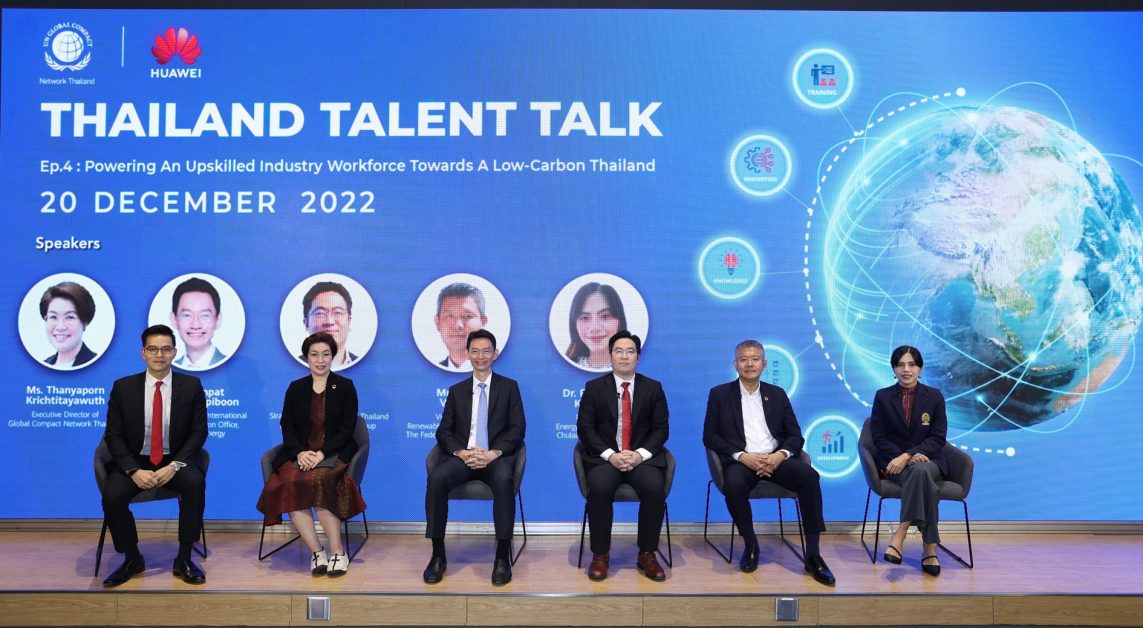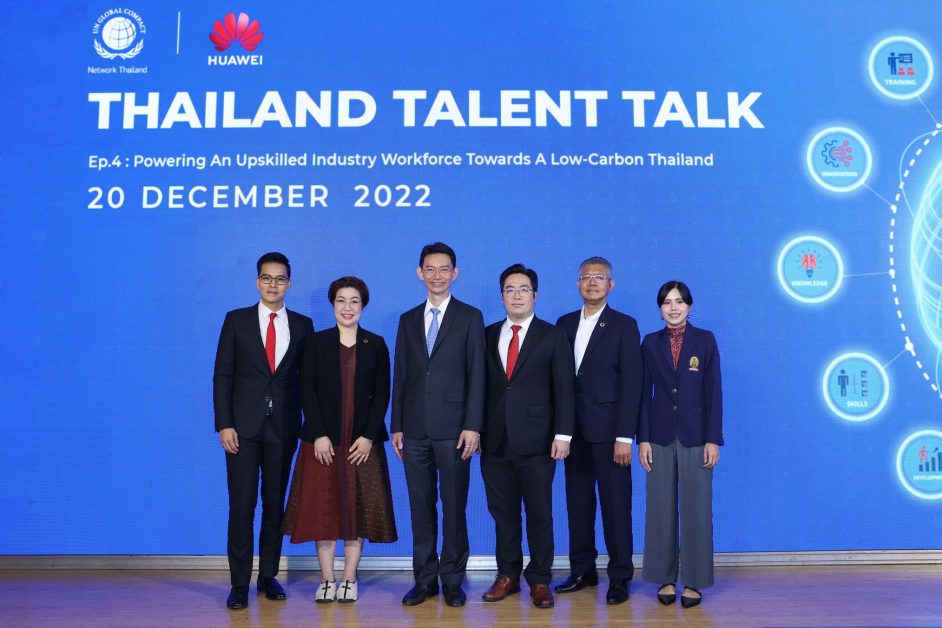Huawei Technologies (Thailand) Co., Ltd., and Global Compact Network Thailand (GCNT) co-organized the “Thailand Talent Talk Episode 4: Powering an Upskilled Industry Workforce towards a Low-Carbon Thailand” seminar, the final episode in a series of talks on digital transformation. At the symposium, the Ministry of Energy, Chulalongkorn University, and the Federation of Thai Industries exchanged opinions to highlight the importance of fostering new digital talents and utilizing technology to assist the drive to Thailand Carbon Neutrality 2050.
The impacts of both Industry 4.0 and COVID-19 on Thailand have warranted the need to scale up the future-readiness of the country’s digital workforce. According to the Thailand National Digital Talent Development White Paper, co-developed by Huawei, the Ministry of Digital Economy and Society, and the Ministry of Higher Education, Science, Research and Innovation, Thailand will face a 500K talent gap by 2030 if no proactive action is taken. The pandemic resulted in digital transformation acceleration, as well as presenting a pathway to a low-carbon and BCG economy model.
To mitigate these challenges, Huawei and GCNT co-organized a series of four episodic seminars throughout 2022 under the theme “Thailand Talent Talk”, which aimed to build an open platform to discuss challenges, practices, and pathways for fostering a favorable ecosystem for low-carbon green development and sustainable growth. Partners presented solutions to current challenges and worked together to find the most effective direction for Thailand to move towards digital transformation, with topics mostly focused on issues around technology, digital inclusion, cybersecurity, SMEs, and startup growth.
In the fourth episode, Huawei and partners stressed that future energy trends in Thailand will transition towards green energy and that both the private and public sector need to work together to create a thriving digital ecosystem to support low carbonization in the future. In addition, in order to embrace new forms of business and to strategically set up an appropriate platform for the future of the workplace, Huawei has worked closely with all related partners to focus more on digital power, innovation for sustainable development, and fostering digital ecosystems through the development of new ICT personnel for Thailand in 2023.
From a macro-level policy perspective, Poonpat Leesombatpiboon, Executive Director of International Energy Cooperation Office, Ministry of Energy, shared the main challenges and opportunities in driving energy transitions and boosting innovation: “Green trends are gaining increasing popularity around the world. We are inspired to see the race to address climate change being widely adopted. In line with this, Thailand became the first ASEAN country to formally propose its own national carbon neutrality 2050 roadmap at the COP26 summit. The Ministry of Energy is the steering force helping Thailand go green, but the public and private sector, educational institutes, and organizations need to collaborate from both within and outside the country to drive towards a greener Thailand.”
Coming from a research and academia angle, Dr. Phimsupha Kokchang, Researcher at Chulalongkorn University, said: “Mindset is very important, if people in the country understand the benefits that low-carbon energy could have on their lives then the goal for net-zero emissions will more easily become a reality. Effective communication is therefore crucial. In addition, as a higher education institute, we must place a greater focus on the development of a digital talent pool and partner with private sector organizations like Huawei or the Federation of Thai Industries to equip younger generations with the skills required for constantly evolving renewable-energy-related industries in the coming years.”
For digital industries, the need to join forces with the public and private sector to create favorable innovation and technology ecosystems for low carbonization has become crucial. “The current progress and potential of renewable energy is accelerating thanks to collaborative efforts from Huawei. Zero carbon emissions have been a major topic for FTI over previous years and will soon have a significant impact on the earth, its people, and the economies of every country” said Arthit Vechakij, Vice Chairman of Renewable Energy Industry Club, Federation of Thai Industries (FTI). “There are more digital talents needed in Thailand who specialize in green innovations. FTI will work with all partners, universities, and Huawei Thailand to help upskill and foster more ICT personnel for Thailand’s digital future.”
Echoing this, the Executive Director of GCNT, Thanyaporn Krichtitayawuth, also shared her opinion: “Key actions and platforms for an innovative and low-carbon Thailand include investing in cleaner technologies and sustainability projects as well as developing capabilities in design thinking towards a Bio Circular Green Economy. We need people who have the ability to think of new business models with resource efficiency and increased investment responsibility to accelerate an environmentally friendly transition towards the reduction of greenhouse gas emissions, as well as to facilitate partnerships to expand knowledge on carbon and energy markets, best low-carbon technologies, and the development of future digital talents in the country.”
Huawei Thailand, as a world-class solar power solutions and ICT provider, places great importance on steering Thailand towards a green future. Their mission is to utilize and leverage their considerable industry expertise to increasingly support various organizations and social sectors. Moreover, Huawei is in the process of accelerating digital skill development for talents through several ongoing initiatives, namely Huawei ASEAN Academy, which has incubated over 60,000 ICT personnel together with 2,600 SMEs. During the seminar, Suthee Traivivatana, Strategic Officer of Huawei Thailand Digital Power Business Group, shared Huawei’s perspective on potential strategies and on key technologies, including the viewpoint that everyone is now moving towards low-carbon societies: This underlines the necessity of having a skilled workforce specifically to cater to upcoming future demands. In Thailand, universities have shown their readiness for these changes, as seen from their more integrated and specialized curricular. In addition, infrastructure is another essential factor for Thailand whereby digital technologies must be appropriately applied and fully compatible. It is therefore with great confidence that Huawei believes their technologies can help drive Thailand towards a sustainable and low-carbon society. Our longstanding expertise in digital power business, together with our various platforms that enable greater partner collaboration, can harmoniously help push Thailand toward lower carbonization.
Thailand Talent Talk is a four-episode seminar, held throughout 2022 in collaboration with the Global Compact Network Thailand (GCNT), topics covering digital inclusive, cybersecurity and SMEs. Thailand Talent Talk gathers partners from the public and private sector, to join hands, present solutions to current challenges, and find the most effective direction for Thailand to move towards sustainable digital transformation.
Driven by its ongoing mission “Grow in Thailand, Contribute to Thailand” for 23 consecutive years, Huawei is fully committed to enabling proactive digital transformation and low carbonization in order to empower a fully connected, intelligent, and sustainable Thailand. Huawei pledges to continue working with the Thai government, customers, and partners to integrate digital innovations and technologies into the Thai digital ecosystem to benefit electric power generation, transmission, and consumption.
Source: Carl Byoir & Associates

